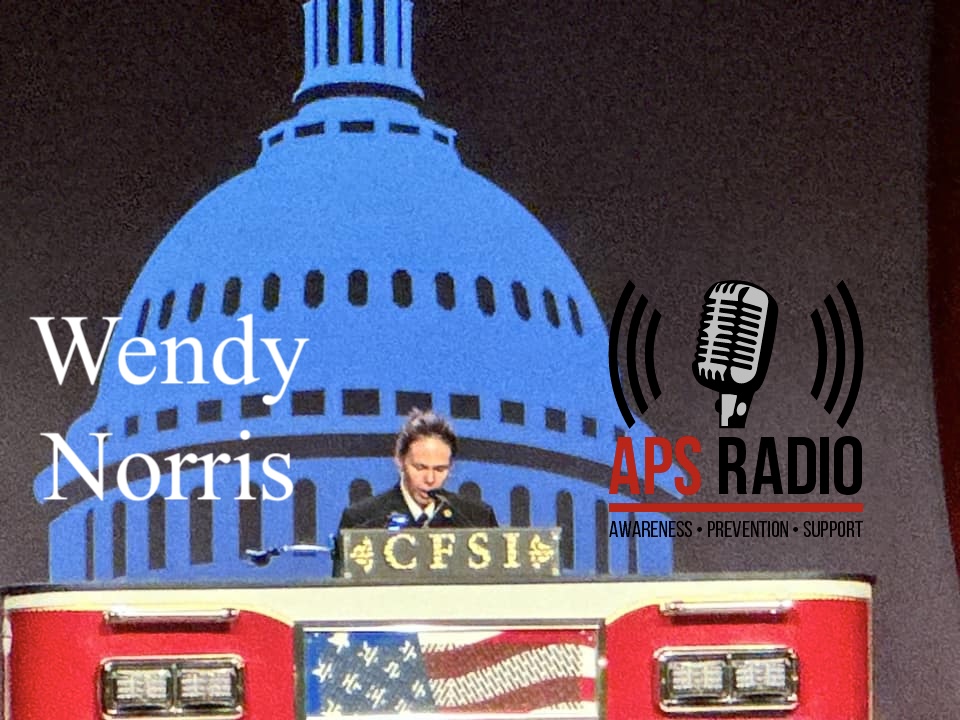Podcast: Play in new window | Download
Subscribe: RSS
On this episode of APS Radio, Wendy Norris, founder and president of the Texas Line-of-Duty-Death (LODD) Task Force, discusses her own near-miss accident and how that led her to create the Texas LODD Task Force. She discusses the emotional and physical challenges first responders face, including mental health struggles, cancer risks, and cardiac issues, inspired by her late husband’s line-of-duty death.
Norris explains how this legacy sparked the upcoming John P. Norris Memorial First Responder Health & Wellness Symposium in Pflugerville, Texas, from September 26 to 28. The event, which runs September 26-28, 2025, will address holistic wellness for firefighters and EMS workers.
Texas LODD Task Force: https://www.texasloddtaskforce.com
John P. Norris Memorial First Responder Health & Wellness Symposium: https://www.firstrespondersymposium.com
This episode emphasizes the following critical topics:
1. THE UNSEEN TOLL OF FIREFIGHTING INJURIES AND RECOVERY
Wendy Norris’s story begins as a young firefighter in California, joining the ranks through an explorer program and quickly developing a passion for both municipal and industrial firefighting. Her career changed forever following a severe on-duty injury during a large structure fire in Texas. A ceiling collapse caused significant respiratory burns and a traumatic brain injury. The injury forced Norris to relearn basic skills such as reading and math, underscoring the physical and cognitive challenges firefighters can face after line-of-duty injuries.
During this conversation, Norris highlights how injuries don’t only affect the body; the mental and social implications weigh heavily, too. She shared memories of her struggle with feelings of isolation, guilt, and shame—including moments where she questioned her own survival. This painful phase led her to found what became the Texas Line of Duty Death Task Force (originally Firefighter Ministries), an organization dedicated to connecting injured firefighters with resources and offering peer support.
2. GRIEF WORK: FROM SURVIVOR TO ADVOCATE
Norris’s connection to firefighter LODD transformed after her husband, Houston firefighter John Norris, passed away due to a heart attack while he was on duty. Having spent over two decades supporting families who lost loved ones, Norris notes that her expertise as a grief educator provided a framework that helped her navigate her own profound loss.
She touches on the complexity of living “in a thin space,” a concept she draws from Celtic tradition, to describe the balance between life and death she inhabits while helping families transition into their grief journey. Norris admits there are challenges in maintaining professional boundaries when you simultaneously experience loss as a family member.
Her work with the National Fallen Firefighters Foundation and the Texas LODD Task Force gives her a unique perspective: she is both a survivor and an advocate. She credits the network of families she’s served for providing crucial support during her mourning—turning the often-isolating path of grief into something more communal. This echo chamber of shared experience emphasizes the importance of peer support programs in the fire service, especially for those wrestling with loss.
3. THE FIRST RESPONDER HEALTH AND WELLNESS SYMPOSIUM: A HOLISTIC APPROACH TO FIREFIGHTER WELL-BEING
Norris is organizing an upcoming event in honor of John Norris, scheduled for September 26-28, 2025, in Pflugerville, Texas. The event aims to address first responder health from multiple angles—mental health, cardiac risks, cancer exposures, and disaster response resilience.
What makes this symposium stand out is its holistic approach. Norris emphasizes that first responder wellness isn’t just about mental health but encompasses the body, mind, and spirit. She shares findings from her husband’s autopsy, which revealed systemic inflammation and respiratory tract damage likely related to firefighting exposures—highlighting the growing need for education in cardiac health and cancer prevention among firefighters.

